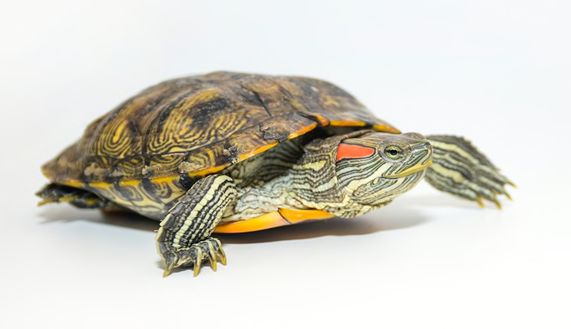Context
The presence of the red-eared slider turtle, an invasive species, in the public water bodies of Kerala has become a cause for concern.

About
- The major concern is as it not only destroys the aqua ecosystem (extinction of native species) but also carries a bacteria which is harmful to the human body.
- Hence, it is known to be a major invasive alien species.
- India is home to 29 freshwater turtles and tortoise species of the 356 turtle species recognised worldwide and around 80 per cent of them are threatened.
- In India, keeping indigenous turtles as pets is prohibited under the wildlife protection act.
- But the foreign breeds are not restricted and are kept as pets in many families across India.
- These small and easy-to-maintain species are a hit in the pets market.
- The species breeds faster compared to other local turtle varieties.
- In India, it is widely found in urban wetlands, such as —
- Sukhna lake in Chandigarh
- Temple ponds of Guwahati
- Lakes of Bengaluru
- Sanjay Gandhi national park in Mumbai
- Yamuna river in Delhi
About Red-eared Slider Turtle
- The red-eared slider is a freshwater turtle with a distinctive red strip behind each ear.
- The red-eared sliders are native to south-eastern USA and Mexico, but have found their way across the globe including India through trade of exotic animals.
- Habitat: They can tolerate a wide range of habitats and are sometimes found in estuaries and coastal wetlands with brackish water.
- They can also tolerate a range of water quality and accept high levels of organic pollutants such as effluent and inorganic pollutants.
- Red-eared slider turtles are classified as controlled pest animals under the Victorian Catchment and Land Protection Act 1994.
- Scientific Name: Trachemys scripta elegans.
- Threat to ecosystem: The red-eared slider turtles are considered a major threat to native turtle specials, as they mature fast, grow larger, and produce more offspring, and are very aggressive. They can out-compete native turtles for food, nestling, and basking sites.
- They can also transfer diseases and parasites to native reptile species.
- The Red-Eared Slider Turtle is considered to be one of the world’s worst invasive species.
- Protection Status
- IUCN Red List: Least Concern
- CITES: N/A
- Wildlife Protection Act 1972: N/A
- Distinctive Features
- They have a broad red or orange stripe behind each eye with narrow yellow stripes marking the rest of the black body, neck, legs and tail.
- They have distinctive long claws on their front and hind legs where claws are longer and more prominent in males than females.
- They retract their head straight back into their shell when threatened. Native turtles tuck their neck to one side underneath the shell.
- Their shell is dome-shaped, likened to the shape of a helmet.
